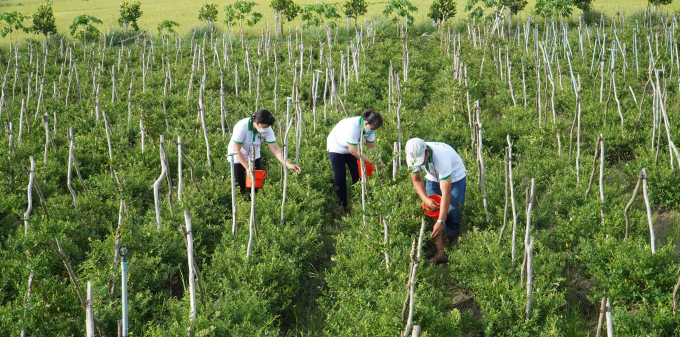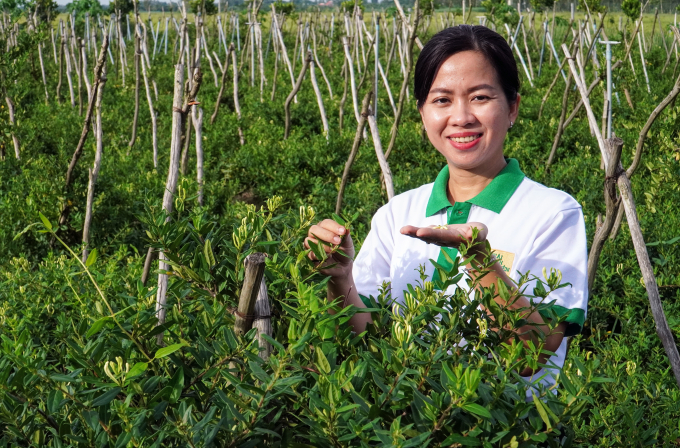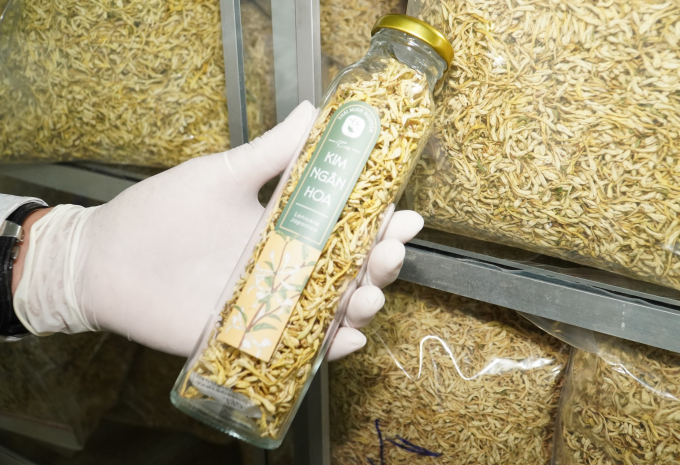June 20, 2025 | 10:54 GMT +7
June 20, 2025 | 10:54 GMT +7
Hotline: 0913.378.918
June 20, 2025 | 10:54 GMT +7
Hotline: 0913.378.918

Vu Minh Tu's 6,000 m2 of honeysuckle in Kien An commune, Cho Moi district, An Giang province. Photo: Kim Anh.
Vu Minh Tu's honeysuckle farm is more than 6,000 m2, having 4,000 honeysuckle flowers. There is also a buffer zone of approximately 4,000 m2 with some other herbs planted and fishes raised in ponds. That is the fortune she has at the age of 37.
When she was still a traditional medicine doctor in 2010, after one time picking medicine for a patient, "I saw molds in the medicine. I asked the clinic how to handle the situation when the medicine was for the patient to use but the herbs were not guaranteed. I was then determined to grow and produce clean medicinal herbs. I stopped working at the clinic, and everything turned to a new page,” Tu said.
To start a business with the herb farm, Tu spent more than 10 years studying and researching honeysuckle, associating with medicinal community groups from the North to the South of Vietnam and went on a journey to search for land suitable for the development of the herb.
“The temperature in the Western land is suitable for the growth of honeysuckle, especially in the sense that it can preserve the medicinal properties of the flower. So I started looking to buy seeds to plant in testing raw material areas and prepare the soil for planting. In 2020, the herb started flowering and trial production started. I also built a brand for my product at that time. By early 2021, dried honeysuckle and honeysuckle tea bags had been introduced to the market.”

Tu spent more than 10 years researching, learning and developing her honeysuckle brand. Photo: Kim Anh.
Choosing drying technology is one of the secrets to helping Tu succeed with her chosen path and gaining customers’ trust. The honeysuckle drying technology she used is freeze drying at a temperature below 25 oC, without preservatives. Tu said that it would be able to retain the inherent medicinal properties of this herb.
Looking at the farming practice in reality, for honeysuckle to grow is a care process full of hardship. The weeds must be discarded by hand, and organic fertilizers are a given. Because as Tu said, using chemical fertilizers might help the herb grow quickly and become large in size, but the fragrance would not be rich, especially the medicinal properties of the flower would be lost, so in the long run the plant could not grow.

Freeze-dried honeysuckle tea made from 100% flower buds. Photo: Kim Anh.
Apart from investing in building material areas, Tu boldly established of Thai Minh Nguyen Trading and Service One Member Co., Ltd to develop honeysuckle tea products. The company produces 250 kg of dried flowers per year on average with the two main product lines being 100% honeysuckle buds and honeysuckle tea in filter bag.
The product has reached health-conscious customers in Hanoi, Quang Ninh, Ho Chi Minh City, Nha Trang, Binh Thuan, Can Tho and An Giang. Gaining a revenue of nearly VND 1 billion in the first year of bringing the product to market, Tu has now built agencies in those areas and established a representative office in Ho Chi Minh city.
Mentioning the development direction in the next period, Tu said, “From the very beginning I was determined to develop clean agriculture specifically herbs. The farm will expand to LocalGAP standards. The product is 100% honeysuckle buds that are freeze-dried to retain their high medicinal properties. The business she owns is completing the application process, and waiting for the OCOP product certification.
Developing OCOP products sometimes makes Tu feels overwhelmed, especially after the transition from traditional medical occupation to agriculture is even more difficult and time-consuming. But thanks to the support of her husband, Tu has more motivation to solidify her determination to develop long-term and sustainable organic medicinal products.
Honeysuckle bloom all year round in the plains, most often from March - May. This is considered one of 30 natural plant antibiotics. According to Vu Minh Tu, honeysuckle can increase the body's resistance, prevent and treat common infections if used frequently. this flower can also be extracted to make cosmetic ingredients, functional foods, pharmaceutical drugs or traditional medicine.
Translated by Samuel Pham
![Turning wind and rain into action: [9] Digitizing hydrometeorological data in response to climate change](https://t.ex-cdn.com/nongnghiepmoitruong.vn/608w/files/news/2025/06/17/z6704423696987_15fd32ffc26d590d204d520c9dac6786-nongnghiep-165943.jpg)
(VAN) Farmers have begun accessing hydrometeorological applications to adjust their cropping schedules, aiming to ensure productivity and adapt to climate change.
![Turning wind and rain into action: [8] Real-time salinity detection and early warning technology](https://t.ex-cdn.com/nongnghiepmoitruong.vn/608w/files/news/2025/06/17/z6704423696987_15fd32ffc26d590d204d520c9dac6786-nongnghiep-151127.jpg)
(VAN) Thanks to the integration of modern hydrological-hydraulic models, remote sensing technologies, and artificial intelligence, the accuracy of hydrological forecasting has significantly improved.
![Turning wind and rain into action: [7] Early disaster warnings help marine farmers minimize losses](https://t.ex-cdn.com/nongnghiepmoitruong.vn/608w/files/news/2025/06/17/z6704423696987_15fd32ffc26d590d204d520c9dac6786-nongnghiep-142942.jpg)
(VAN) In recent years, thanks to early disaster warnings and forecasting, marine farmers in Khanh Hoa province have been able to reduce risks and losses, thereby improving production efficiency.
![Turning wind and rain into action: [6] ‘Four on-the-spot’ disaster management software](https://t.ex-cdn.com/nongnghiepmoitruong.vn/608w/files/news/2025/06/17/e5a48259d6a262fc3bb3-nongnghiep-183800.jpg)
(VAN) By simply activating the scenario on the disaster management software, the relevant authorities immediately know how many households need to be evacuated, where to evacuate them to, and by what means of transportation…
![Turning wind and rain into action: [5] Hue applies modern technology in disaster forecasting](https://t.ex-cdn.com/nongnghiepmoitruong.vn/608w/files/news/2025/06/17/z6704423696987_15fd32ffc26d590d204d520c9dac6786-nongnghiep-093938.jpg)
(VAN) In Hue city, modern technology has recently been applied in meteorological and hydrological forecasting and warning, helping to reduce the damage caused by natural disasters.

(VAN) A cutting-edge farming technique being implemented on an experimental ranch in Arizona's Sonoran Desert has already saved a billion gallons of water over five years, according to Civil Eats.

(VAN) Poultry and pig production and the environment can be boosted through enhanced water technology, according to new research.